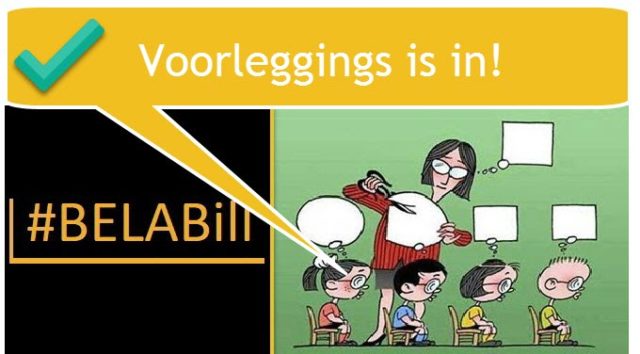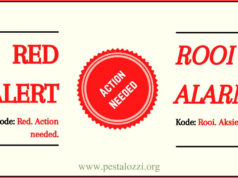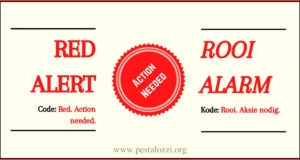
BELA Bill published and commented
The Pestalozzi Trust sent in their second, more comprehensive submission on the BELA Bill to Adv Deon Rudman of the DBE on the 10th of January, 2018. This submission replaces the original submission of the Pestalozzi Trust.
On the 13th of October, 2017 the draft Basic Education Laws Amendment Bill (BELA Bill) was published for public comment. The public was given 4 weeks to comment on the bill, and homeschool organisations did not receive any prior warning of the publication of the bill. The BELA Bill proposes amendments to inter alia the SA Schools Act (84/1996), and amounts to a stringent increase in control over homeschoolers, by proposing compulsory annual assessments by “competent” assessors, constricting the curriculum for home education to a curriculum comparable in content and skills to the national curriculum, limiting school-leaving qualifications for homeschoolers to the NSC, and by increasing the penalty for non-attendance/registration from 6 months to 6 years jail sentence.
The homeschooling community in South Africa responded to this challenge by sending in an overwhelming number of submissions, which was not surprising, since the best interests of their children are at stake. Using the BELA Bill Fact/Act Sheet, as well as the guidelines and templates supplied by the Pestalozzi Trust, members and supporters of the Pestalozzi Trust sent in an impressive number of submissions by the closing date for comments, the 10th of November, 2017. The Pestalozzi Trust, as well as the various Associations for Home Schooling, also submitted their comments. A large number of cottage school owners, parents and learners also submitted comments on the BELA Bill. No provision is made in the BELA Bill for cottage schools or learning centres.
Draft Policy on Home Education published
A week after the closing date for comments on the BELA Bill another storm hit home education in South Africa: the Draft Policy on Home Education was published for commentary. According to Mr Christopher Cordeiro, consultant to the Pestalozzi Trust, “The policy is based on sound principles but the practical provisions are unworkable and in fact violate the very principles the DBE articulates in the policy document itself.” Again a very short period was granted for comments, viz 3 weeks, till the 8th of December, 2017. Many requests for extension were sent in to Ms Phindile Ngcobo, the official in the DBE responsible for receiving the comments on the Draft Policy. Although many comments were sent in by the closing date, the closing date for comments was eventually extended by the Minister to the 31st of January, 2018. Like Adv Rudman, who agreed to accept anonymous submissions on the BELA Bill via the Pestalozzi Trust, Ms Ngcobo also agreed to accept anonymous submissions on the draft Home Education Policy via the Pestalozzi Trust.
Extension granted at Portfolio Meeting
At the portfolio committee meeting in Parliament on the 28thof November, 2017, which was attended by a number of homeschoolers, the Director General of the DBE, Mr Mathanzima Mweli, described the comments submitted on the BELA Bill as “an avalanche”, which he had never seen before in his career in public service. On the same day the Deputy Minister of Basic Education, Mr Enver Surty, who was also present at the meeting, extended the comment period for the BELA Bill to the 10th of January, 2018.
Anonymous submissions delivered
The DBE agreed to accept anonymous submissions by worried parents on the BELA Bill via the Pestalozzi Trust. Upon agreement with Advocate Rudman these anonymous submissions were handed to him on the 15th of December, 2017, which was the only date that he was available before the December holidays. Mrs Karin van Oostrum, Executive Officer of the Pestalozzi Trust, was accompanied to the meeting by her daughter and son-in-law, Cornelia and Cilliers Marais, as well as by Mrs Elsabe Coertze, the attorney who acts for the Pestalozzi Trust in the anonymising process.
Seen in the photos are ex-homeschoolers Cilliers and Cornelia Marais, and Joanette le Cornu, who are toiling away at the anonymising process. Also in a photo are Karin van Oostrum and her daughter, Cornelia Marais, when then delivered the anonymous letters to Adv Rudman of the DBE.




A most successful campaign!
Mr Bouwe van der Eems, Chairman of the Pestalozzi Trust, made the following comment on the number of letters generated for the BELA Bill and the draft Policy:
Using the letters sent to homeschoolfreedom1996@gmail.com as a gauge, the number of letters generated by the homeschooling movement is as follows:
- Letters requesting extension of closing date for comments on the BELA Bill: 280
- Letters with comments on the BELA Bill: 990, of which 440 are anonymous
- Letters requesting extension of closing date for comments on the draft Policy: 110
- Letters with comments on the draft Policy: 700
It is estimated that there are about 100 000 homeschooling families in South Africa. It is estimated that this movement generated about 2200 letters that were sent to the DBE. This gives a parent participation rate of about 2.2%.
FEDSAS is the body representing School Governing Bodies (SGBs) and has about 2070 members. If it is assumed that every member represents about 300 parents, then FEDSAS represents about 621 000 parents. According to the DBE, they received about 6000 objections to the BELA Bill, of which it is estimated that about 1000 are from homeschoolers. This gives a parent participation rate of about 0.8%.
To evaluate the percentage of parent participation, it is valuable to compare the participation in this campaign with the following.
The City of Cape Town (COCT) requested public participation on a proposed drought levy. In order to mobilise Capetonians, a Facebook group was created “Stop COCT”, which mobilised ratepayers to send in about 50 000 objections. Given that there are about 700 000 ratepayers, this gives a household participation rate of 7%. However, if it is assumed that the average household consists of 3 adult residents, then the residents participation rate is 2.3%.
Although the COCT campaign would seem to be as successful as the homeschool campaign, the following factors must be taken into account:
- Homeschooling families had to write their own letters and send it to DBE, whereas the website of the COCT campaign made it very easy to generate an email.
- Many homeschooling families were concerned that sending an email to DBE could expose them to prosecution by the DBE. For this reason about 45% of submissions were sent anonymously. However,there might be a significant number of parents who were discouraged to submit an objection, due to the risks involved.
- The subject matter of homeschooling legislation is much more complex than the subject matter of a drought levy.
Given that the homeschool parents were exposed to more risks and complexities than the Capetonians, the homeschoolers’ campaign for positive home education legislation can be regarded as probably one of the most successful and blessed public participation campaigns in the history of South Africa.





